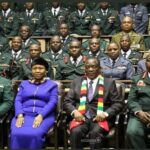A Zimbabwean was found with E2,8 million cash (about US$153 000) at King Mswati III International Airport.
King Mswati III International Airport is located in Sikhuphe, 50km from Manzini. Masiyakurima Agrippa Bopela (Masiya), entered the kingdom last Monday with the equivalent of E2 897 183 in US dollars and attempted to leave the country the following day with the cash after a local bank reportedly declined him permission to deposit the money.
After police officers stationed at the airport seized the money, the director of public prosecution (DPP) swiftly ran to court for an order to have it formally kept by the police pending further investigations into its source and destination. It is suspected that the money was obtained through illicit means, it is proceeds of ill-gotten activities, money laundering or possibly to finance terrorism. The police are reportedly suspecting that the Zimbabwean, who is purportedly a well-known businessman in his home country, was working with high profile local people hence the need for further investigations.
In the urgent application to formally seize the money, which the DPP moved in terms of the Prevention of Organised Crime Act (POCA) 2018, she related how the Zimbabwean was caught, his attitude towards the police during their preliminary investigation and the suspicions the law enforcer had about the source of the money.
Narrating events leading to the recovery of the money, Head of Asset Forfeiture Unit under the DPP’ Office, Principal Crown Counsel Elsie Matsebula, submitted that upon arrival at the airport, Masiya (46) went through the immigration processes and thereafter moved to the Department of Eswatini Revenue Services (Customs), where he declared an amount of US$153 000 (E2 820 000). Upon completion of the declaration process, said Matsebula, the Zimbabwean was released to go with the cash.
She told the court that the information about the bulk cash amount was received by investigators based at Lubombo Regional Police Headquarters in Siteki under the Financial and Economic Crimes Money Laundering and Asset Forfeiture Unit.
According to Matsebula, on the following day, Masiya was back at the airport to fly out of the country. A police officer, Sergeant Delisile Vilakati, who was at the Central Screening Point, noticed that Masiya had cash in his bag, submitted Matsebula.
She said the officer asked Masiya if he had declared the cash and he indicated that he had done so when he arrived in the country the previous day. Matsebula said Vilakati informed Masiya that he was supposed to declare it again when departing.
“Masiya was taken back to the Customs’ desk where he handed the cash to the officers and it was counted. It totalled US$153 860. US$3 860 was in Masiya’s pockets. Vilakati then asked him for the source of the cash before she appended her signature on the declaration form. Masiya failed to produce the source of the funds. She then reported the matter to her superiors. The cash was seized,” submitted Matsebula.
The financial investigators were informed about the arrival of Masiya back at the airport with the cash and they rushed there. Among the team were Detective Sergeant Steven Mlambo and Detective Inspector Msibi. They were called to make preliminary financial investigations about the money in issue. Matsebula submitted that the investigators enquired from Masiya about the reasons to carry such a huge amount as well as the source of the cash.
The principal Crown counsel stated that Masiya developed an attitude and became aggressive towards the officers. She said he was against being questioned about the cash and this led to an argument between him and the officers.
She averred that another Zimbabwean – a holder of Eswatini citizenship – who was accompanying him, Dr Godfrey Gandawa, intervened and informed Masiya about the need to cooperate with the financial investigators, who were carrying out a legal mandate. Matsebula said the intervention calmed investigators down and he told the investigators that he was a businessman.
“He told them that he went to First National Bank in Manzini to deposit the cash but they refused, telling him he was not allowed to make such a bulk deposit, but he could split the cash into denominations of US$5 000 (E94 250) and deposit same on a daily basis. He then left the bank since he could not stay in the country for so many days for such a process to be carried out,” said Matsebula.
This information, according to Matsebula, was confirmed by Masiya’s attorney at Siteki Magistrates Court when an attempt was made by the investigators to detain the cash in terms of Money Laundering and Financing of Terrorism (Prevention) Act 2011. A magistrate ordered that the US$3 860, which was in his pockets, be released to him for his personal expenses.
During the questioning at the airport, submitted Matsebula, Masiya sent some documents through WhatsApp to Sergeant Mlambo, which he argued were in support of the claim that the source of the cash was a legal business. However, Masiya is said to have been unhappy when Sergeant Mlambo asked for some time to download the documents and he allegedly quickly deleted ‘for everyone’ the information he had sent to Mlambo. The information remained stored in the sergeants phone.
Matsebula informed the court that the investigators seized the cash and told Masiya to proceed with his flight. “He refused to leave the country without his cash. Instead he made frequent calls on his cellphone,” Matsebula stated.
The declaration form he completed when he arrived last Monday reflected that he was declaring an amount of US$150 000 and the source of the funds was allegedly Business Group Bopela Eswatini. In the declaration form, Masiya completed when he was about to exit the country, he neglected completing the part on the source of funds, the court was told. Matsebula submitted that Masiya’s conduct did not show that he was an astute businessman. She submitted that an online search showed that there was a company named Bopelo Eswatini.
“The investigators went to the company premises in Matsapha as reflected online and found a company by the name of Eswatini Scaffolding Framework. It is, however, brought to the attention of the court that the cash was imported into the country and an attempt to deposit it was made. Further it was being taken out of the country when it was seized.
It is difficult to believe that the local company is a source of this cash property. An enquiry was made with the Eswatini Revenue Service and the information received was that the company registered as a taxpayer in 2020 but it never filed any returns,” said Matsebula. She added that an online search showed that Masiya was a well-known businessman in Zimbabwe. However, she stated that it was clear from his actions that he entered Eswatini to try and launder the cash by attempting to place it within the banking financial system. According to Matsebula, when Masiya failed, he quickly tried to leave the country with the cash.
– Times of Swaziland












